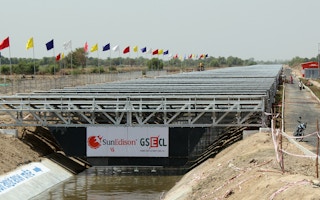Funds to help farmers adapt to climate change, ultra-modern solar power plants and schemes to promote women’s safety in cities are among pledges India’s new government made in its first budget on Thursday.
Prime Minister Narendra Modi’s government, which swept to power in May, said in its 2014/15 budget that it would establish a National Adaptation Fund to help millions of farmers adapt to changing weather patterns resulting from global warming.
“Climate change is a reality which all of us have to face together. Agriculture as an activity is most prone to the vagaries of climate change,” Finance Minister Arun Jaitley told parliament.
“To meet this challenge, I propose to establish a National Adaptation Fund for climate change. As an initial sum an amount of 100 crore (rupees) ($18.5 million) will be transferred to the fund.”
Farming makes up makes up almost one-sixth of India’s GDP, but the sector is highly reliant on monsoon rains which are becoming increasingly erratic.
“
The government also planned to launch a $74 million scheme for solar power-driven agricultural water pumping stations for 100,000 pumps and to spend a further $18.5 million on developing 1 MW Solar Parks on canal banks
Jaitley said the ruling coalition - led by the Bharatiya Janata Party (BJP) - would also promote clean energy, and announced plans to build solar power plants in four states.
“New and renewable energy deserves a very high priority. It is proposed to take up ultra mega solar power projects in Rajasthan, Gujarat, Tamil Nadu, and Ladakh in Jammu and Kashmir. I have set aside a sum of 500 crore rupees ($93 million) for this,” said Jaitley.
He said the government also planned to launch a $74 million scheme for solar power-driven agricultural water pumping stations for 100,000 pumps and to spend a further $18.5 million on developing 1 MW Solar Parks on canal banks.
India is desperate for power, and coal is expected to remain at the heart of its energy security for decades. Seventy million households – up to 40 percent of the country’s 1.2 billion people - have no access to electricity.
Jaitley listed a series of tax breaks for renewable sources of energy, including exemptions from excise duty on components used in the manufacture of solar photovoltaic cells and wind-operated generators.
Environmentalists were sceptical.
“The recognition that climate change is real and that the need to ‘adapt’ is urgent is a very important message of Budget 2014,” said Sunita Narain, director of the Centre for Science and Environment.
“The FM (finance minister) provides $18.5 million for a national adaptation fund. While it can be argued that this is too little, … this is a first step to recognise the need to invest in building resilience of poor communities against climate change. The question now is, what will this money be used for?”
Gender education
Jaitley also announced proposals to address the rise in violence against women in India.
“Women’s safety is a concern shared by all the honourable members of this House. We need to test out different approaches that can be validated and scaled up quickly,” he said.
The government plans to spend $9 million on a pilot scheme to improve women’s safety on public transport, and an additional $28 million in large cities.
“Crisis Management Centres” will also be set up in all government and private hospitals in the capital, to provide support to victims of crimes such as rape and domestic violence.
The number of crimes against women in India reported to the police such as rape, dowry deaths, abduction and molestation increased by 26.7 per cent in 2013 from a year earlier, rising to 309,546 from 244,270, the National Crime Records Bureau says.
“It is a shame that while the country has emerged as a major player amongst the emerging market economies, the apathy towards female children is still quite rampant in many parts of the country,” said Jaitley.
“Therefore I propose to launch Beti Bachao, Beti Padhao Yojana (Save Our Daughters, Educate Our Daughters Scheme) which would help in generating awareness and also help in improving the efficiency of delivery of welfare services meant for women.”
Gender sensitisation campaigns are also required to bring about greater public awareness and stem discrimination and abuse against women and girls, the minister said, adding that school curriculums would have a separate chapter on gender issues.

















